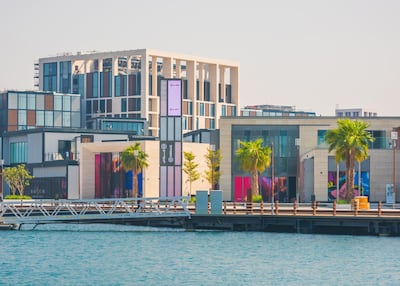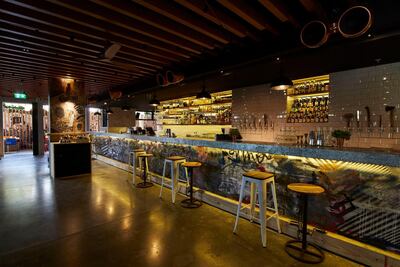The year began on a high note, with Dubai being ranked as having the eighth most diverse food scene in the world, according to a survey by Bott & Co, British travel insurance specialists. It analysed Google Maps data to glean which cities cater to multifaceted gastronomic tastes. Beating foodie capitals such as Los Angeles, San Francisco, Montreal and Tokyo, Dubai was found to encompass the culinary heritage of 62 nationalities. Unsurprisingly, the emirate played host to the majority of the many, many restaurants that opened in the UAE this year, from Beefbar and Crazy Fish in January to The London Project at the end of the year.
New restaurants
As with years past, chefs and restaurateurs came to our shores in droves in 2018, armed with new flavours, innovative dishes and cuisine from all corners of the world. The emirate's love affair with celebrity chefs, many of whom oversee Michelin-lauded eateries, continued, with new openings by Pierre Gagnaire (Pierre's Bistro & Bar), Alain Ducasse (Mix Dubai) and Gordon Ramsay (Hell's Kitchen), plus the eponymous eateries of Masaharu Morimoto and Akira Back of Iron Chef. Dubai stalwart Zuma turned 10 this year, while Hakkasan relocated from Jumeirah Emirates Towers to Atlantis, The Palm.
Fine-dining aside, the city also welcomed simpler, but no less stylish eateries, from Urth Caffe at City Walk to Hard Rock Cafe at Dubai International Airport. Lebanese eatery Bebabel opened in The Dubai Mall, which is also host to a new outlet of popular Taiwanese eatery Din Tai Fung, which in turn has a new sister restaurant, Han Shi Fu, at Aloft City Centre Deira.
The emirate also benefited from a sprinkling of relatively uncommon cuisines: Balkan food at 21 Grams, healthy Nigerian fare at Catfish, home-cooked French dishes at Le Frenchy, and Italian-Japanese fusion at All’Onda.
Abu Dhabi’s two latest Rotanas spawned a number of dining options: Turtle Bay Bar & Grill, Si Risorante Italiano and Hamilton’s Gastropub at Saadiyat Rotana Resort, and Warehouse Tapas Bar and Dino’s Bistro Italiano at Pearl Rotana Capital Centre. Dubai imports Skinny Genie, Chateau Blanc, Coffee Club and Black Tap also opened outlets in the capital this year. Regional restaurateur Sergio Lopez (of Tom&Serg fame) branched out on his own with Sanderson’s Cafe at Al Seef Resorts and Spa by Andalus, while Texan chain Dickey’s BBQ Pit opened its first international branch in Yas Mall.

Meanwhile, four years after opening Pots, Pans and Boards in Dubai, British chef Tom Aikens teamed up with luxury hotel group Edition to curate the menus for three signature restaurants at The Abu Dhabi Edition property, which officially opened its doors in Al Bateen in November. As Aikens puts it: “As a chef, you’re always evolving, and I think coming to places like the Middle East where you can be quite diverse in your cooking, the whole research and new concepts is really what makes you tick.”
Food hubs and festivals
The streets of several hitherto sleepy pockets in Dubai transformed into dining destinations to be reckoned with, notably Al Seef on Dubai Creek and The Yard in Al Khawaneej. The former houses Egyptian restaurant Khofo as well as Kim’s Singapore Seafood and Emirati cafe Al Fanar among others, while the latter encompasses Last Exit D89, plus an organic farmers' market, a bakery, and a smattering of air-conditioned and open-air dining spaces. Home to Ain Dubai, Bluewaters Island opened to the public this year, too, with a series of waterfront restaurants (from the Coffee Club and London Project to gourmet burgers at Ketch-Up), plus Caesars Palace.
In Abu Dhabi, Urban Retreat opened at Yas Mall as the city’s first food incubator, which gathers a dozen vendors from the UAE in a fun, quirky setting. The street-food-style offerings change every three months; the current lot of vendors include Maria Bonita taco shop, Off the Hook seafood restaurant, Revolution Kitchen for American comfort food and Sukkar Dose.
This year also celebrated the fifth annual outings of both the Dubai Food Festival in February, with events such as Beach Canteen, Bites at the Beach and Restaurant Week; as well as Taste of Abu Dhabi in November, which offered bite-sized fare from 12 first-time eateries including Burger & Crab, Dai Pai Dong, Theatre by Rhodes and Shang Palace. Taste of Dubai, meanwhile, returned in March for its 11th year, with plenty of dishes, cooking challenges and celebrity chefs, plus a new workshop on how to make and use butter by French chef Charles Soussin and cheesemonger Francois Robin. Earlier this month, Abu Dhabi Food Festival named Mexico as its guest of honour, and a variety of Mexican dishes and chefs were celebrated at the event.
The holy month of Ramadan, which started in May this year, saw a number of iftar menus, from traditional buffets at Sofra Bld at Shangri-La Hotel Qaryat Al Beri, Abu Dhabi, and Emirates Palace, and tents at The Ritz-Carlton Dubai and Atlantis, The Palm, to more innovative offerings such as a Jamaican iftar at Miss Lily’s, one with Chinese flavours at Hakkasan Abu Dhabi and a healthy Mediterranean-inspired iftar at La Petite Maison in Abu Dhabi and Dubai.

Conscious consumption
Despite what the excerpts presented thus far might suggest, this year also saw a major drive in clean, conscientious eating, both in terms of awareness and action. For one, the UAE declared war on plastic waste this year, with high-profile recycling stations appearing at key locations around Abu Dhabi and Dubai. Supermarket chain Waitrose conducted its first trial in charging for plastic carrier bags in the capital, while the new Jumeirah at Saadiyat Island Resort is believed to be the first in the UAE to ban single-use plastics throughout its premises.
Plastic straws and bottles were taken off the table at restaurant chains such as Freedom Pizza, The Noodle House, Pizza Express, Royal Orchid and Coya, as well as hotel groups including Hilton, Anantara, Park Hyatt and Gates Hospitality (which includes Bistro Des Arts, folly by Nick & Scott, Publique, Reform Social & Grill, The Black Lion, Ultra Brasserie and Via Veneto). Basta! by David Myers in Business Bay even went a step further and introduced straws made out of pasta, while Urban Retreat rewarded diners who brought their own plates and cups with discounted bills.
Veganism was another trending topic, with foodies, chefs and restaurants advocating the benefits and importance of the movement that’s taking over the world. From vegan iftars to meat substitutes in supermarkets, the UAE’s food industry responded to the growing demand for a plant-based diet with aplomb. Even Christmas treats went vegan, with eateries such as SugarMoo, Tub of Butter, Simple Cafe and Eat Well offering meat- and dairy-free baked goods and desserts.

Bareburger made the Beyond burger a permanent fixture on its menu. Created using a vegan patty, which purports to cook, look and taste like one made from beef, the B12 bleeding burger is so described because, when cut in half, it reveals an authentically pink centre and “bleeds” beetroot juice instead of blood. Even chef Giorgio Locatelli introduced a 40-dish plant-based menu at Ronda Locatelli, with options such as pizza with vegan cheese made from coconut milk and soya; spaghetti alla puttanesca with tomato sauce, black olives, cherry tomatoes and capers; and sfera di cioccolato, a dairy-free chocolate sphere with coconut ice cream, mixed berries and hot raspberry sauce.
Sustainable farming and local produce, too, had their day in the sun. Taste of Abu Dhabi hosted its first farmers’ market this year, in collaboration with Local Harvest, a brand under the Abu Dhabi Farmers’ Services Centre. Visitors were able to sample and shop for fresh produce cultivated in farms in Abu Dhabi, as well as meet the farmers to find out, first-hand, about the vast range of vegetables, fruit, meat and eggs locally grown in the UAE. In addition to bringing freshly cultivated produce to consumers, ADFSC is also educating farmers on the importance of supplying the market with high-quality, fresh and tasty produce.
Spinneys, meanwhile, made a move towards food traceability through a food-labelling trial, in partnership with agricultural assurance organisation GlobalGAP (those three initials stand for Good Agricultural Practice). The system was trialled with fruit from small-scale farms in South Africa. The thought process is that all produce will come with a special GGN label. Once you scan the QR matrix code on the product’s display board, you’ll be taken to a microsite that’s unique to the farm (or group of farms) responsible for growing the produce, with links to their websites and social media accounts, so you know exactly where your food is coming from.
Culinary controversies
To end things on a spicy note, here are three issues that got us hot and bothered this year. In June, JW Marriott Marquis Dubai terminated its contract with celebrity chef Atul Kochhar following a controversial tweet, where he said "Hindus have been terrorised by Islam for 2,000 years". Kochhar was essentially trolling Priyanka Chopra, whose character on Quantico foiled a terror plot by Hindu extremists to frame terrorists from Pakistan for an attack on Kashmir.
In September, beloved brunch spot Axe House in JLT, Dubai suddenly shut up shop. While the management cited the closure as a case of “emergency maintenance”, and promised the eatery would reopen within days, disgruntled employees spoke of not being paid for months and being left job- and visa-less overnight. The space now houses British-themed pub Hoxton Bar & Urban Eatery.
Finally, in November, Dubai chef Izu Ani locked horns with Foodiva founder Samantha Wood, who put up a less-than-flattering review by a third-party writer of Ani’s new restaurant Gaia on her blog. The chef responded by saying: “The people that matter, they love it. And the people that don’t matter, like her … I’ve banned her from setting foot anywhere near here.” Wood, in turn, said: “It is disappointing that Izu believes food writers such as I don’t matter. This is not the attitude he took when my guest reviewers and I favourably rated Carine, Izu Brasserie, Lighthouse and La Serre over the last seven years.”
_________________________
Read more:
Ruby chocolate: here's what to know about the latest food trend
Chef Giorgio Locatelli: ‘You can have a delicious meal without meat and fish’
Foodie fusion: Behind the Italian-Japanese cuisine at new Dubai restaurant All'Onda
_________________________




